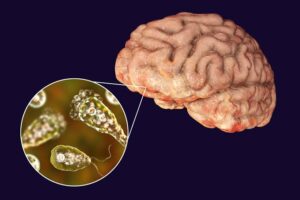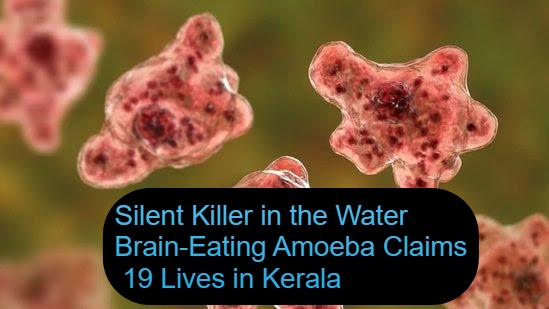Kerala, known for its serene backwaters and lush landscapes, is now grappling with a terrifying microscopic threat—Naegleria fowleri, commonly known as the brain-eating amoeba. This rare but deadly organism has already claimed 19 lives across the state, sending shockwaves through communities and putting health authorities on high alert.
The amoeba thrives in warm freshwater bodies such as lakes, rivers, hot springs, and even poorly maintained swimming pools. Infection occurs when contaminated water enters the body through the nose, often during swimming or bathing. From there, it travels to the brain, causing a severe and usually fatal condition called Primary Amebic Meningoencephalitis (PAM).

Victims often experience symptoms like high fever, severe headaches, vomiting, stiff neck, and confusion—similar to bacterial meningitis. Unfortunately, the infection progresses rapidly, and most patients succumb within a week of symptom onset. With no definitive cure and a survival rate of less than 5%, prevention remains the most critical defense.
Health experts suggest that the recent surge in cases could be linked to rising temperatures and stagnant freshwater sources—ideal breeding grounds for the amoeba. Kerala’s hot and humid monsoon conditions may also be contributing to the organism’s spread.
Authorities have launched awareness campaigns urging the public to avoid swimming or bathing in warm stagnant water, especially in areas where cases have been reported. People are also advised to use sterilized or boiled water for nasal rinsing and avoid diving or jumping into freshwater bodies where water might enter the nose.
Dr. Anitha Menon, a public health specialist in Kochi, stated, “This is a wake-up call. Proper water hygiene, awareness, and early symptom detection are key to preventing more deaths.”
Local governments are stepping up efforts to chlorinate public pools, clean reservoirs, and monitor water quality. However, experts believe that long-term public education and strict water safety practices are essential to curb further spread.
While Naegleria fowleri infections are rare, their deadly nature makes them a public health emergency that cannot be ignored. As Kerala faces this invisible enemy, timely action and vigilance are the need of the hour.

